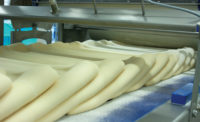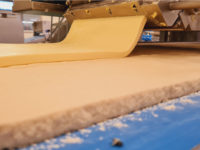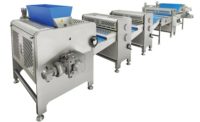Effectively and efficiently handling dough is integral to many snack and bakery operations. And the needs producers have today are diverse. Smaller footprints, hygienic design, easy recipe management control, simple sanitation and maintenance, the versatility to make specialty products of various kinds, and the flexibility to make different products on the same lines are all top-of-mind for snack and bakery manufacturers in the market for laminators and sheeters.
Moline Machinery, Duluth, MN, works to fit machines into customers’ existing spaces, offering, for example, a compact flatbread system that’s less than 30 feet long. “We still have four reduction stations,” says David Moline, vice president, sales and marketing. “It’s capable of very high speeds. It’s a line that can be fitted to, within reason, almost any facility.”
Benier, Nieuwjuijk, the Netherlands, has noticed trends toward a desire for smaller size and greater flexibility in machinery, says Katja Loermans, marketing coordinator. “It’s either a lot of products, or a lot of different products on the same line.”
Customers of Reiser, Canton, MA, are looking for precision and versatility, says John McIsaac, vice president of strategic business development. “Producers come to us when they want to be able to precisely put down fats reliably and easily,” he says. “They want their shortening, margarine or butter to follow the dough in the line.”
Minimized changeover time due to simple tooling has been a key focus of Rademaker, Hudson, OH, says Nick Magistrelli, vice president of sales. “Your operators are only able to put back tools in a certain way.” That prevents the opportunity for operator error. “The line is able to be up and running, and to be efficiently creating the product that is required,” he says. “If the line isn’t running, you’re not making money.”
Koenig Bakery Systems, Ashland, VA, hears from customers who want smaller footprint, greater flexibility and a more-hygienic design, says Richard Breeswine, CEO. “A certain length is needed for gentle dough processing, but due to changeable modules—e.g., forming stations or seeding units on frames—modules can be changed where necessary.” Also, he notes, hygienic design is a very important issue for bakeries due to allergy concerns, staff safety and the propensity for flour, dust and waste dough to get stuck in machines, sometimes grinding them to a halt.
Easy maintenance, and simple and efficient sanitation to minimize downtime are top desires for customers of AMF Bakery Systems, Richmond, VA, says Hans Besems, executive product manager. They also want “intuitive operation with recipe management control for consistent product quality,” he says.
Customers of Moline Machinery also been interested in products with fillings—particularly meat-filled products, as the desire for protein continues to grow. That brings the requirement for a full washdown given the greater sanitation concerns related to meat, he says.
Reading Bakery Systems, Robesonia, PA, has seen greater interest in sheeted specialty snacks like baked potato and cracker crisps, says Shawn Moye, vice president of sales. “There has also been a large interest in producing gluten-free products on sheeting lines. The result has been lots of formulation adaptations to create very similar products that have no gluten on the same sheeting lines.”
Koenig has also seen customer requests for specialty products like brioche, challah, Hispanic products and gluten-free buns and rolls, Breeswine says. “Products can be automated, which have been made by hand before—while still retaining the artisan character.”
New and improved
Rademaker recently rolled out a new line called the Sigma platform that hits the sweet spot the company wanted in terms of simple, efficient changeovers where tools can only be put back a certain way, Magistrelli says. “It was designed to the highest standards in the baking industry with regard to sanitation and operator-friendliness.”
The company also has developed—but has not yet delivered to North America—the Rademaker Mini, a machine targeted toward artisan players and midrange wholesale bakeries, Magistrelli says. The Mini can be wet-cleaned and offers the same dough flow control, product quality and attention to detail. It also offers a modular setup for adding or subtracting products and is capable of handling a wide spectrum of doughs, he says.
Moline Machinery has been offering inline laminating to solve the floor-space issue, Moline says. “That’s been able to provide bakers with a solution that they may not have thought possible. We’re able to take that dough sheet, make a small, quick turn with it, and then laminate on the same belt.”
Moline Machinery also has been making incremental improvements on other lines—for example, installing automated monitoring systems that can account for subtle changes in the dough throughout the process. “We can incorporate automatic powered rolled gap adjustments,” Moline says. “We can make conveyor speed changes in an automated fashion, as well.”
Benier and its parent company, the Kaak Group, have rolled out a new sheeting concept for baguettes called the L’Artisane, which gives bakers a lot of flexibility, because eliminates the need for a final proofer, notes Loermans. The L’Artisane system uses bulk fermentation, handling the dough gently, she says, adding that the system fits in existing industrial bakery lines and can produce up to 15,000 full-size artisan baguettes in an hour.
AMF Tromp has designed a new Butter/Fat Extruder for its laminator that offers maximum temperature control to minimize any increase in the heat, Besems says. “The new compact design eliminates the monopump and the pipes that feed the butter and/or fat to the laminator,” he says. This gets rid of this issue of the fat recrystallizing and becoming hard, which can cause damage upon re-starting the machine.
From a sanitation standpoint, this provides another advantage, because butter or fat is less likely to remain in the machine with the reduced number of parts, while also eliminating waste, Besems says. The machine’s tool-less product changeover minimizes downtime while enabling easy changeover between fat types, he says.
Reiser works with companies like Rademaker, Moline Machinery and AMF Tromp to outfit sheeting and lamination lines, McIsaac says. Reiser’s Vemag feed system and control system has upgraded the ability to sheet fats at very low, precise rates, he says. “Our Vemag’s unique system is fully adjustable and uses just the required amount of vacuum and mechanical force to load our double-screw pump, allowing bakers to produce their products according to their requirements—not the equipment’s requirements,” he says. “The Vemag double-screw system features interchangeable double-screws, allowing us to match the correct double-screw with the product. This ensures that cost is under control with minimal giveaway and correct calorie counts.”
Reading Bakery Systems offers recipe-driven equipment, so that loading between one product and another can be done with the touch of a button, Moye says. “If sanitation is required between products, we have a sanitation mode that sets the equipment for easy access to be sanitized, and then it can be returned to normal operation by loading the new recipe.”
Recent design changes have removed all chains and sprockets to make everything direct-driven, enabling on-the-fly speed changes through variable-frequency drives while reducing maintenance, Moye says. “Also, much of the equipment has been placed on servos to ensure that the product being produced is always in the correct location. All RBS equipment is designed to our SafeShield Program specifications, which means it is easily cleaned and maintained.”
Koenig offers two types of sheeting lines: the Menes-H Industrial Dough sheeting line, and the Artisan SFM EC Dough line for artisanal bakeries. The Menes-H features a three-roll dough sheet former that can be used for different doughs, offering a flexible range of products like loaf bread, baguette, doughnuts and pita bread, Breeswine says. The unit offers hygienic design features like sealed bearings that make it entirely washdown-compatible, and a redesigned frame construction to minimize surface contamination, enabling quick changeovers and shorter downtimes.
The Artisan SFM is a modular system that’s easy to clean because parts can be quickly disassembled. And it’s suitable for artisan bakeries because it can be converted so rapidly. The system handles doughs from 100 percent wheat to 100 percent rye, ranging from whole-grain buns to Mediterranean ciabatta, Breeswine says. “The Artisan SFM EC features a completely new and gentle system of dough sheet production.”





